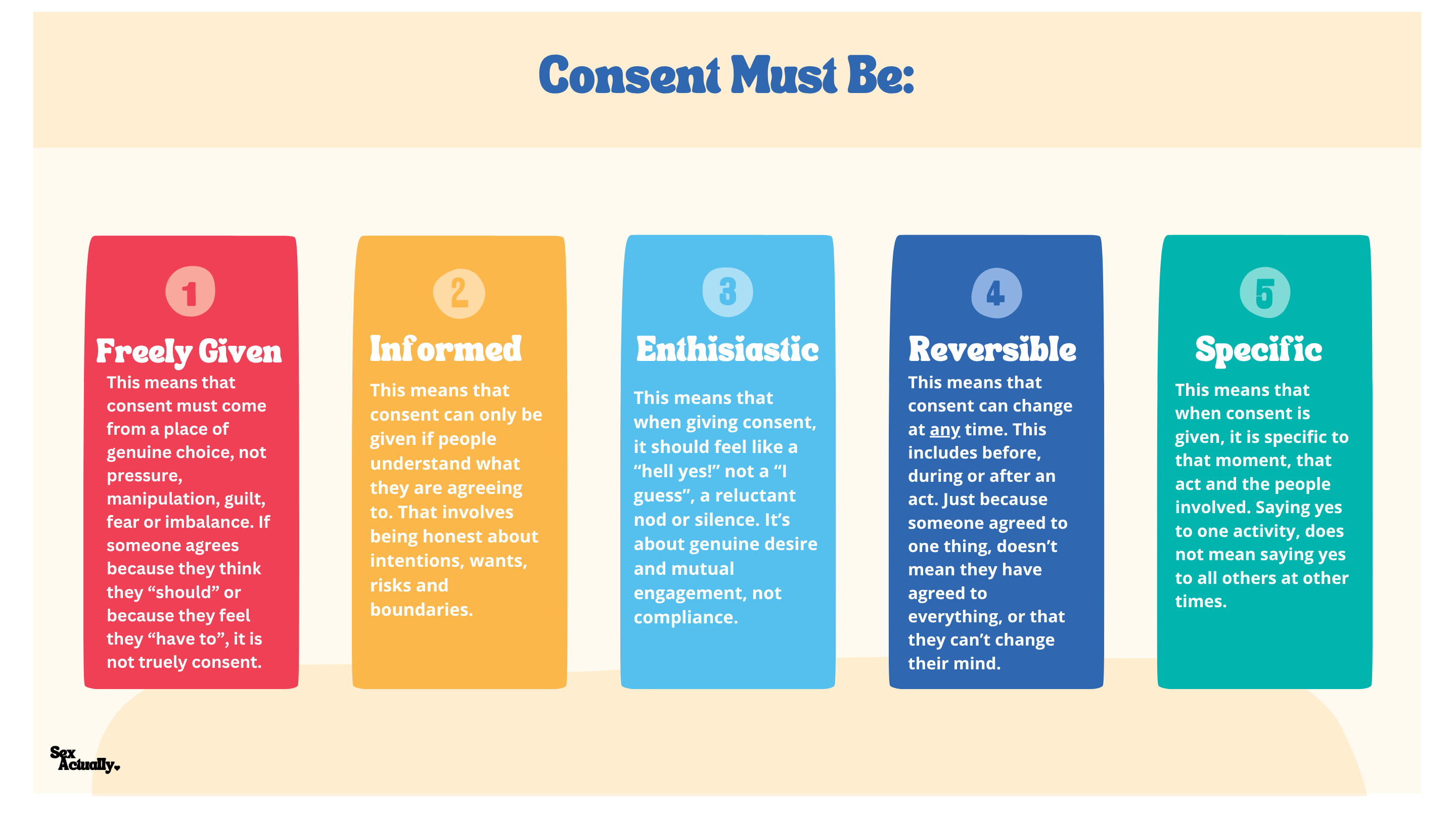When it comes to sex with others, consent is essential. It is at the heart of every healthy sexual relationship. But consent can feel like a big and complex topic. So what do we mean by consent and what does it look like? Is a nod enough? What if someone doesn’t say no but doesn’t exactly say yes either? And what happens when one or all parties leave feeling uncertain or uncomfortable?
This article aims to unpack consent including what it is, how the law sees it, why getting consent can feel hard sometimes, and what happens if it’s missing.
What is consent?
Consent is an agreement between individuals to engage in sexual activity. In order for consent to be given, there are multiple requirements. These state that consent must be:
- Freely given
- Informed
- Enthusiastic
- Reversible
- Specific
But what do these requirements mean and what do they look like?

This might sound like a lot, but think of it this way: would you want someone to do something to you if you weren’t totally sure, or didn’t really want it? Consent is about mutual clarity and comfort. It is not just about avoiding harm, but sharing connection in a respectful way.
Consent and the Law
In most legal systems, sex without consent is sexual assault or rape, even if no physical violence is involved. The legal definition may vary by country or region, but core principles are similar:
- Silence or lack of resistance does not equal consent.
- Being drunk, high, asleep, or unconscious usually means a person cannot legally give consent.
- Consent must be ongoing — it can be taken back at any point.
Even if no one intended harm, crossing the line of consent can have serious emotional and legal consequences.
But while the legal definition may sound straightforward, proving whether someone consented, especially in court, is often anything but simple.
Courts typically look for evidence of:
- A clear and voluntary "yes"
- The ability to give consent (i.e. not impaired by alcohol, drugs, fear, or coercion)
- Whether the person felt free to stop or say no at any point
But here's where it gets complicated.
In real life, many sexual encounters happen behind closed doors with no witnesses, no messages exchanged about boundaries, and sometimes no verbal communication at all. The result? A legal system that often relies on "he said / she said" narratives, and that historically hasn't always believed survivors; especially women, LGBTQ+ people, and people of colour.
Someone might have:
- Frozen in the moment instead of fighting back
- Felt pressured but didn’t say “no” out loud
- Regretted or questioned the encounter afterward, not out of confusion, but because they never felt fully safe or in control
None of this means the person wasn't harmed. But it does mean that the law may not always recognise harm unless it fits a narrow, visible model, like yelling, physical struggle, or saying “no” clearly and repeatedly.
This is why understanding consent needs to go beyond what’s legally provable. Ethical sex is not just about what you can get away with legally; it's about ensuring both people feel safe, empowered, and free to say yes or no at every step.
If you’ve had a sexual experience where you felt harmed, violated, scared, or unable to say no, it wasn’t your fault. Whether it happened with a stranger, a date, a friend, or a partner, you are not to blame, and you deserve support.
Your experience is valid, even if:
- You didn’t fight back
- You didn’t say “no” out loud
- You were drinking or under the influence
- You’re not sure if it “counts” as assault— If you felt scared, trapped, pressured, or harmed, that’s enough.
You don’t need to have all the answers or a perfect memory. You are allowed to feel confused, hurt, angry, numb, or all of the above.
What to do:
Make Sure You're Safe
If you're in immediate danger, call 999.
If you're no longer at risk but feeling unsafe or overwhelmed, try to get to a trusted friend, family member, or find a safe location.
Consider Getting Medical Care
You can:
- Go to your nearest Accident & Emergency department (A&E) for treatment and support
- Visit a Sexual Assault Referral Centre (SARC) — these are specialist centres that provide confidential medical care, forensic exams (if you choose), and emotional support
You don’t need to report to the police to access a SARC. Everything is your choice.
📍 Find your nearest SARC:
www.nhs.uk/service-search/other-services/Rape-and-sexual-assault-referral-centres
Get Emotional Support
You can talk to a trained specialist, regardless of when it happened.
- Rape Crisis England & Wales
📞 0808 500 2222 (Freephone, open 24/7)
🌐 rapecrisis.org.uk - SurvivorsUK (supporting men, boys, and nonbinary people)
📱 Text: 020 3322 1860
🌐 survivorsuk.org - Galop (for LGBTQ+ survivors of abuse)
📞 0800 999 5428
🌐 galop.org.uk
Decide Whether to Report It (Or Not)
You have the right to report what happened to the police — immediately, later, or never. It’s your decision.
If you want to talk it through first, Rape Crisis or SARCs can help you understand your options and rights.



